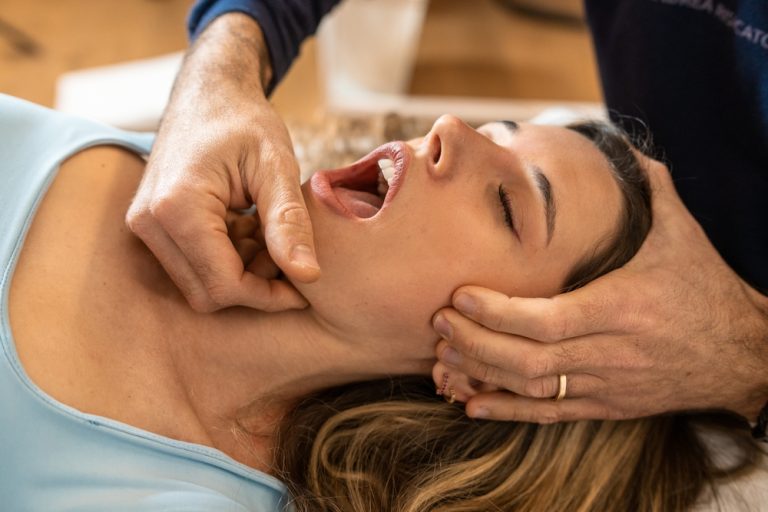TMJ Disorder Causes in Pembroke Pines, Fort Lauderdale, and Aventura, FL
Understanding the Roots of Jaw Pain with The Dental Care Group
Temporomandibular joint disorder (TMD) is a condition affecting the jaw joints and muscles that control jaw movement. It can cause pain, discomfort, and limited function, impacting daily activities. Pinpointing the exact cause of TMD is often difficult, but understanding the various contributing factors can help people reduce their risk and seek appropriate care.
Experiencing TMD symptoms? Don’t wait for the pain to worsen. Schedule a consultation with The Dental Care Group today! Our friendly South Florida dental team will assess your condition and explore the most effective treatment options for you. Call our Aventura office at 305-935-2797, Pembroke Pines at 954-430-2300, or Fort Lauderdale at 954-963-3706.
The Jaw Joint: A Complex System
The temporomandibular joint (TMJ) connects your lower jaw (mandible) to your skull. You have one TMJ on each side of your face, located in front of your ears. This joint enables you to move your jaw up and down, side to side, and forward and backward. It facilitates essential functions like chewing, speaking, and yawning. TMD arises when there are problems with the jaw joints, the muscles controlling jaw movement, or the surrounding tissues.

The Dental Care Group Approach to TMD
At The Dental Care Group, we are committed to providing comfortable, affordable, and convenient dental care. We are intent on delivering high-quality, personalized care to each patient. Our practice values your feelings and requests, with the goal to have your experience with us be enjoyable.
Cutting-Edge Technology
We remain current with the most innovative technology and research. This allows us to provide effective and efficient care. Our team partakes in constant continuing education to remain up to date on new and better treatments.
Comfort First
Our number one priority is your comfort. During your initial consultation, we will address any concerns you may have. This is done to make you completely comfortable with your dental care plan.
Common Contributors to TMJ Disorders
Several factors can contribute to the development of TMD. In many cases, the exact reason for this condition may not be clear. TMD pain may stem from a combination of factors. These include jaw injuries, arthritis, or genetics.
- Improved Jaw Function: Treatment can restore normal jaw movement. It addresses the underlying causes that restrict function. Personalized strategies can allow you to enjoy everyday activities such as eating and speaking again.
- Alleviation of Pain and Discomfort: Professional intervention can significantly reduce pain in the jaw, face, neck, and shoulders. By targeting the source of the discomfort, treatment offers a pathway to relief. Many individuals find they can perform daily tasks without constant pain.
- Minimized Headaches and Migraines: TMJ disorders often trigger or exacerbate headaches. Specifically, they can even cause migraines. TMJ treatment can lessen the frequency and intensity of these headaches by addressing the root cause. This leads to an enhanced sense of well-being.
- Reduced Risk of Dental Problems: Addressing TMJ issues prevents further damage to your teeth and gums. Conditions like teeth grinding can lead to tooth decay and gum disease. Early intervention protects your long-term oral health.
- Better Sleep Quality: TMJ disorders frequently disrupt sleep patterns, which leads to difficulty falling asleep. They can also lead to sleep apnea. Treatment can improve sleep quality, leading to more restful nights.
- Alleviation of Ear and Facial Pain: The proximity of the TMJ to the ears and facial muscles means that TMJ disorders often cause pain in these areas. Effective treatment can reduce earaches and facial pain, improving comfort and well-being.
- Reduced Stress and Anxiety: Living with chronic pain can negatively impact mental health. By alleviating pain and discomfort, TMJ treatment reduces stress and anxiety. This contributes to a more positive emotional state.
- Personalized Treatment Plans: Every patient experiences TMJ disorders differently. Treatment plans should be crafted to address specific symptoms and underlying causes. A strategy such as this maximizes the likelihood of successful outcomes.
Additional Risk Factors for TMD
Certain factors can increase your likelihood of developing TMD. Women are more prone to TMD than men. This may be related to hormonal differences or a higher chance of having fibromyalgia. TMD is most common between the ages of 20 and 40, although it can occur at any age. A family history of TMD or other joint disorders may suggest a genetic predisposition.
Habits That Exacerbate TMD
Certain habits can worsen TMD symptoms. These include nail biting, gum chewing, and teeth clenching. Maintaining poor posture can strain the neck and jaw muscles, intensifying TMD symptoms.
The Role of Oral DNA Testing in TMJ Treatment
At The Dental Care Group, we utilize cutting-edge technology to provide a detailed understanding of your oral health. Oral DNA testing can identify the specific types of bacteria present in your mouth. It also assesses your genetic susceptibility to certain conditions. This knowledge allows us to develop a treatment plan tailored to your needs.
Identifying Bacteria
Some bacteria can worsen inflammation and pain associated with TMJ disorders. Oral DNA testing helps pinpoint these harmful bacteria, guiding targeted treatment. This can lead to better management of TMD symptoms.
Assessing Genetic Predisposition
Genetic factors can influence your likelihood of developing TMJ disorders and related conditions. Oral DNA testing can identify gene markers associated with inflammation and immune response. This information allows us to proactively address potential risks and customize preventative strategies.
Discover your oral health risks with Oral DNA testing at The Dental Care Group! This assessment can help us create a prevention strategy for you. Call our Aventura office at 305-935-2797, Pembroke Pines at 954-430-2300, or Fort Lauderdale at 954-963-3706 to learn more.
When to Seek Dental Care for TMD
It’s important to consult with a dentist or healthcare provider if you experience persistent jaw pain or other TMD symptoms. Seeing a doctor is especially advised if your symptoms interfere with daily activities.
- Persistent Jaw Pain: Consistent pain in the jaw, face, or ears is a key sign. This discomfort warrants a professional assessment. If the pain is severe, it’s time to seek help.
Limited Jaw Movement: Difficulty opening or closing your mouth fully may indicate a TMJ issue. This can manifest as stiffness or locking of the jaw.
- Unusual Jaw Sounds: Clicking, popping, or grating sounds during jaw movement can point to TMD. While these sounds are not always a sign of a problem, they can be indicative of joint dysfunction.
- Bite Changes: Noticing changes in your bite or how your teeth fit together can signal a TMD. This can involve a feeling that your teeth aren’t aligning properly.
- Headaches and Related Symptoms: Frequent headaches, especially those concentrated in the temples or around the eyes, can be connected to TMD. Other related issues are dizziness and earaches.
Frequently Asked Questions
Can TMD be prevented?
While it’s not always possible to prevent TMD entirely, several measures can reduce your risk. Maintaining good oral hygiene, avoiding excessive chewing, and managing stress are beneficial. Practicing proper posture can also alleviate strain on the jaw muscles.
Who is most likely to develop TMD?
TMD can affect anyone, but it is more prevalent in women aged 18 to 44. People with arthritis, jaw injuries, or chronic stress are also at a higher risk. Awareness of these risk factors can help individuals take proactive steps to manage their oral health.
How does TMD progress if left unaddressed?
Without treatment, TMD symptoms often worsen. Mild discomfort can evolve into severe pain, impacting your ability to eat, speak, or sleep. Seeking early intervention can prevent the condition from progressing and improve your overall quality of life.
What are the initial signs of TMD?
Early signs of TMD include jaw pain, tenderness, and clicking or popping sounds in the jaw joint. You might also experience headaches, earaches, or difficulty opening your mouth wide. Addressing these early indicators can help prevent the condition from escalating.
Find Relief from TMJ Disorder Today!
Understanding the potential causes of TMD is the first step in taking control of your oral health. If you are experiencing any of the symptoms mentioned above, we encourage you to reach out to The Dental Care Group for a comprehensive evaluation. Our experienced team will work with you to determine the underlying cause of your discomfort and create a plan that provides lasting relief.
Contact our Aventura dental office at 305-935-2797, Pembroke Pines dentists at 954-430-2300, or our dentists in Fort Lauderdale at 954-963-3706. We look forward to helping you achieve a healthy, pain-free smile.
Locations Performed in
What they say
Carlos Corretjer
Elaine Adler
Dave Chase
Yesenia Ruiz
Maria Perez
Payment Information
CASH

CHECK

CREDIT CARD

Financing

The cost of your treatment will vary depending on your individual needs and treatment plan. We will discuss with you the cost of your treatment and each of your available payment options before you begin, so that you can make the best choice for you.
We offer:
- Easy Payment Options
- Affordable Savings Plans
- Web Specials
- Dental Care Group Discount program



 Limited Jaw Movement
Limited Jaw Movement
















